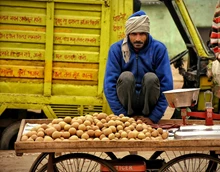
Nestle (NESN.S) announced on Thursday that it will start paying cocoa farmers money if they send their children to school instead of tending crops, as part of a commitment to source all of its cocoa through a completely traceable, directly sourced supply chain by 2025.
Investors, consumers and governments are increasing pressure on chocolate manufacturers to ensure that the cocoa beans they source are not produced using child labor or in illegal cocoa plantations in protected forests, both of which are frequent in West Africa.
The food company behind KitKat chocolate bars and Smarties confectionery has announced that it will triple its current annual spending on sustainable cocoa to 1.3 billion Swiss francs ($1.41 billion) by 2030.
"Nestle’s new initiative focuses on the root causes of child labor and the existential income inequality facing farmers and their families," Nestlé CEO Mark Schneider said during a webcast.
He said the new income increase program was an important step forward for agricultural practices that benefit farmers and the environment, but also acknowledged that the path to a subsistence income for cocoa growers will be very long and winding.
A recent University of Chicago survey found that 45 percent of farming households in cocoa-growing regions like Ivory Coast and Ghana were engaged in child labor.
Ivory Coast Prime Minister Patrick Achi said his country welcomed the new plan, saying it would help companies and the country meet the requirements laid out in looming due diligence legislation, especially in the European Union.
“We must at all costs and by all means deal with the root cause of the ills on which we all agree, which is that the income of the farming population,” he said during the webcast, adding that Ivory Coast and Ghana’s living income differential had up to now yielded mixed results.
To qualify for the payments from Nestle, farmers need to send their children to school prune cocoa trees, plant shade trees and diversify their income with other crops or livestock.
To check that children really are attending school and farmers are following the rules, IDH, The Sustainable Trade Initiative, will monitor the program with other third parties.
Children casually helping on family farms outside of school time don't fall into the International Labor Organization’s definition of child labor.
So far, the sustainability schemes utilized by chocolate companies have had limited success in addressing human rights and environmental concerns in cocoa, and Western governments are now trying to legislate.
Nestle said 51% of the cocoa it used in 2021 was directly sourced and traceable, versus 46% in 2020. By 2025, it wants to be able to trace 100% of its cocoa back to specific farms under its in-house sustainability scheme, the Nestle Cocoa Plan.
"We're extremely confident this will be a game changer on the way to decreasing the risk of child labor," Magdi Batato, Nestle's head of operations, told Reuters this week in an interview.
‘Big Step Forward’
Farmers will receive direct cash payments of up to 500 Swiss francs ($543) per year under the new scheme, which Batato claimed represented 20-25 percent of a farmer's average annual income. The incentive will then be leveled at 250 francs after two years and progressively extended to all of Nestle’s 160,000 cocoa farmers by 2030.
Unlike existing per-tonne premiums, which can encourage overproduction, Nestle, which consumed over 436,000 tonnes of cocoa in total in 2020, stated that it will pay farmers and their spouses directly, regardless of volume produced.
"An incentive to the household is much more inclusive of the smaller farmers, truly making sure that nobody is left out," Nestle's head of confectionery, Alexander von Maillot, said in an interview.
Nestle plans to launch KitKat products made with cocoa from farmers that received financial incentives next year. Von Maillot stated that the company's efforts may eventually result in higher consumer prices.
"Over time, there will undoubtedly be a rise in price for some of the products," he said, adding that customers were willing to pay provided responsible business practices justified the price. According to Batato, operational efficiencies would also help fund the investment.
The VOICE Network, a global grouping of non-governmental organizations and trade unions working on sustainability in cocoa, said Nestle’s cash transfer plan was “a big step forward”.
It added, however, that cash transfers were not a substitute for a commitment to paying a fair overall price for the bean and farmers were still vulnerable to low world market prices.











